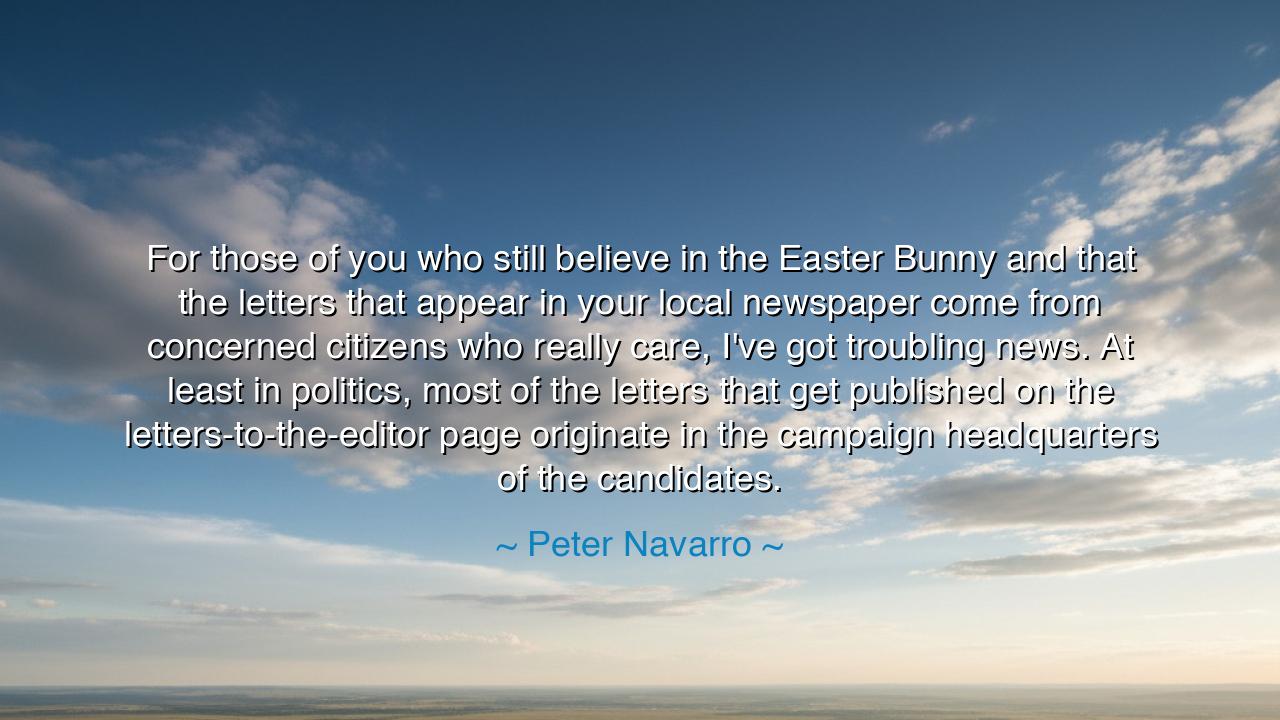
For those of you who still believe in the Easter Bunny and that
For those of you who still believe in the Easter Bunny and that the letters that appear in your local newspaper come from concerned citizens who really care, I've got troubling news. At least in politics, most of the letters that get published on the letters-to-the-editor page originate in the campaign headquarters of the candidates.






When Peter Navarro said, “For those of you who still believe in the Easter Bunny and that the letters that appear in your local newspaper come from concerned citizens who really care, I've got troubling news. At least in politics, most of the letters that get published on the letters-to-the-editor page originate in the campaign headquarters of the candidates,” he spoke not with mockery, but with the sharp voice of disillusionment — a man pulling back the curtain to reveal the machinery behind the illusion. His words pierce the comforting veil of innocence, reminding us that in the age of mass communication, truth is often crafted, and authenticity, a rare virtue. What appears spontaneous and sincere may in fact be calculated, written not by the heart of the people, but by the hands of strategists.
The origin of this statement lies in Navarro’s experiences within the political world — a world where messaging is as carefully designed as the architecture of empire. He understood, as few do, that in the theater of politics, the battle for minds is fought not only through speeches and debates, but through the written word disguised as the voice of the people. Letters to the editor, once symbols of democratic participation, had become, in his observation, instruments of persuasion — part of the grand illusion that the public was united in thought and sentiment. His mention of the Easter Bunny, a childhood myth, serves as a metaphor for naivety itself — a gentle yet cutting reminder that those who cling to comforting illusions are often the easiest to deceive.
In the ancient world, the sages warned of similar dangers. Plato, in his Republic, spoke of the shadows on the cave wall — illusions created by unseen forces to manipulate the minds of those who could not see the light. Navarro’s quote is a modern echo of that same warning: that what we read, what we hear, and what we believe are often shaped by hidden hands. Just as the rulers of old employed poets and heralds to mold public opinion, so too do modern campaigns employ writers and editors to craft the illusion of popular will. The appearance of truth, as history shows, is often more powerful than truth itself — and therein lies both the genius and the peril of political communication.
There is tragedy in this revelation, for it speaks to the erosion of trust, the foundation upon which societies are built. Once, the written word was sacred — the voice of the citizen, the tool of philosophers, the record of reason. When that word becomes corrupted, when sincerity becomes strategy, the bond between people and power begins to fray. The citizen, believing himself part of a great dialogue, discovers he has been conversing with an echo. Like the prophets of old, Navarro does not condemn the system merely to scorn it, but to awaken its people — to remind them that vigilance is the price of liberty, and that discernment is the shield against deception.
Consider the lessons of Julius Caesar’s Rome, where public opinion was swayed not by the wisdom of the crowd, but by the manipulation of rhetoric and rumor. Pamphlets, speeches, and public letters were used to glorify some and destroy others. The people believed they were choosing their heroes, but they were, in truth, being guided by orchestrated words. History repeats this pattern in every age — from the empires of parchment to the empires of pixels — because the instruments of illusion change, but human credulity does not. The wise, therefore, must learn to look beneath the surface of every message, to seek not who speaks, but who benefits.
Navarro’s tone, though biting, conceals a deeper call to wisdom and responsibility. If the letters of the world are written by unseen hands, then it falls to the individual to sharpen his discernment — to read critically, to question motives, and to resist the narcotic of easy belief. The ancients taught that truth is like fire: it burns, it illuminates, and it demands courage from those who seek it. To abandon that pursuit, to surrender thought to the convenience of appearances, is to live in darkness, even when surrounded by light.
Thus, the lesson of Peter Navarro’s words is both humbling and empowering: do not believe too easily. Look beyond the page, beyond the voice, beyond the illusion of sincerity. The world will always contain those who shape stories to their advantage, but the wise will not be easily moved by flattery or fear. Be as the philosophers of old — skeptical, discerning, yet never cynical. For cynicism rejects truth altogether, while wisdom seeks it relentlessly. And though the world may whisper myths dressed as truth, the vigilant mind, awakened and discerning, becomes the last and truest guardian of freedom.






AAdministratorAdministrator
Welcome, honored guests. Please leave a comment, we will respond soon